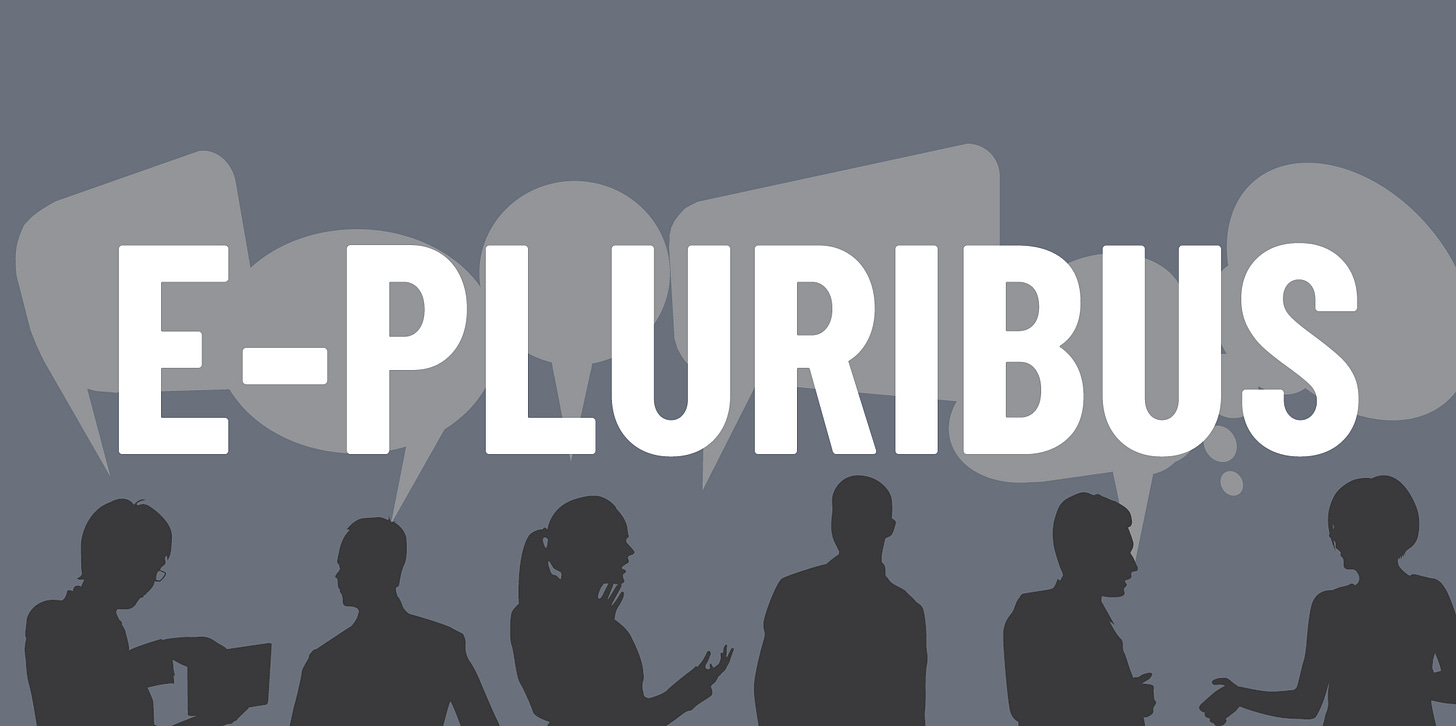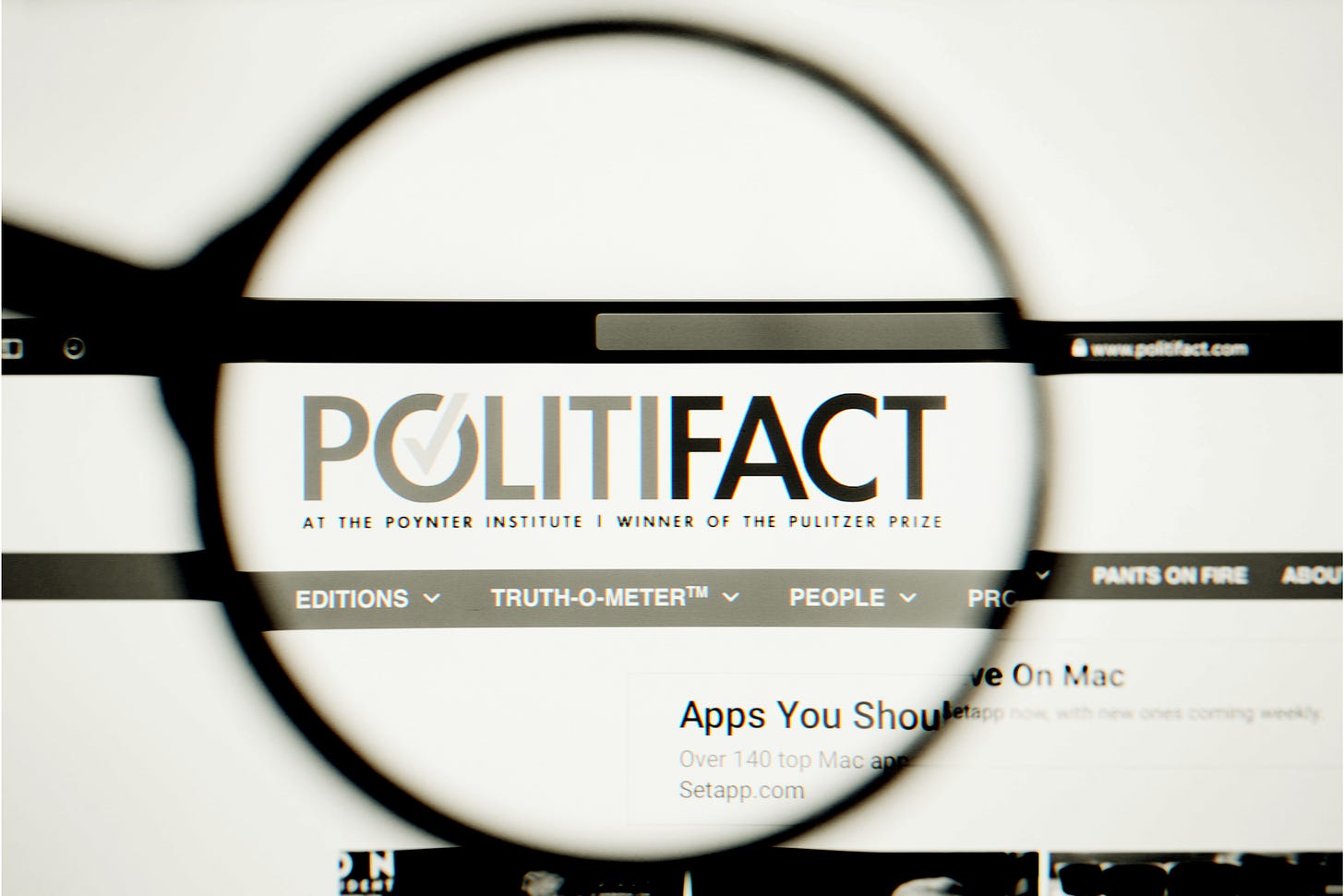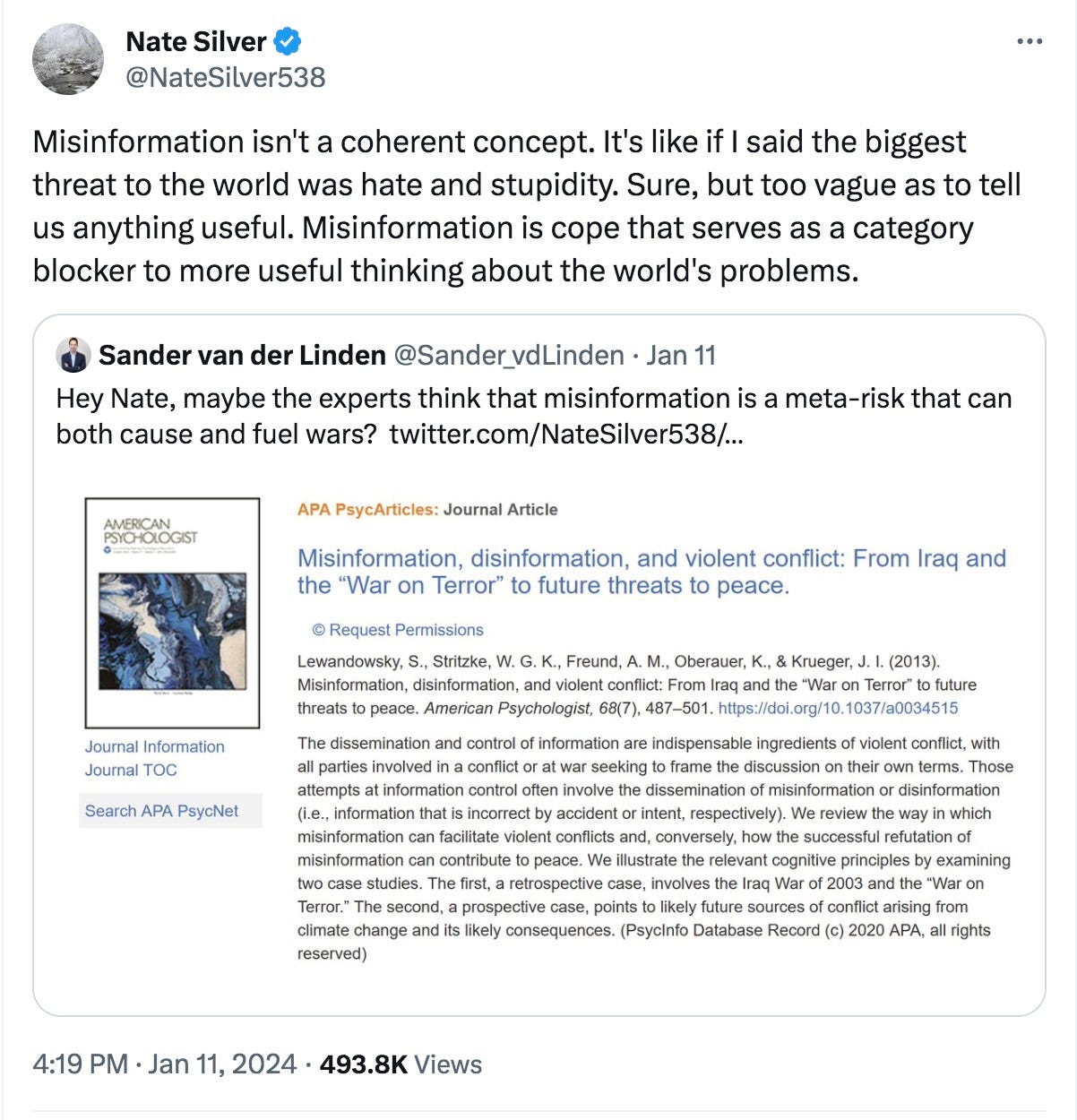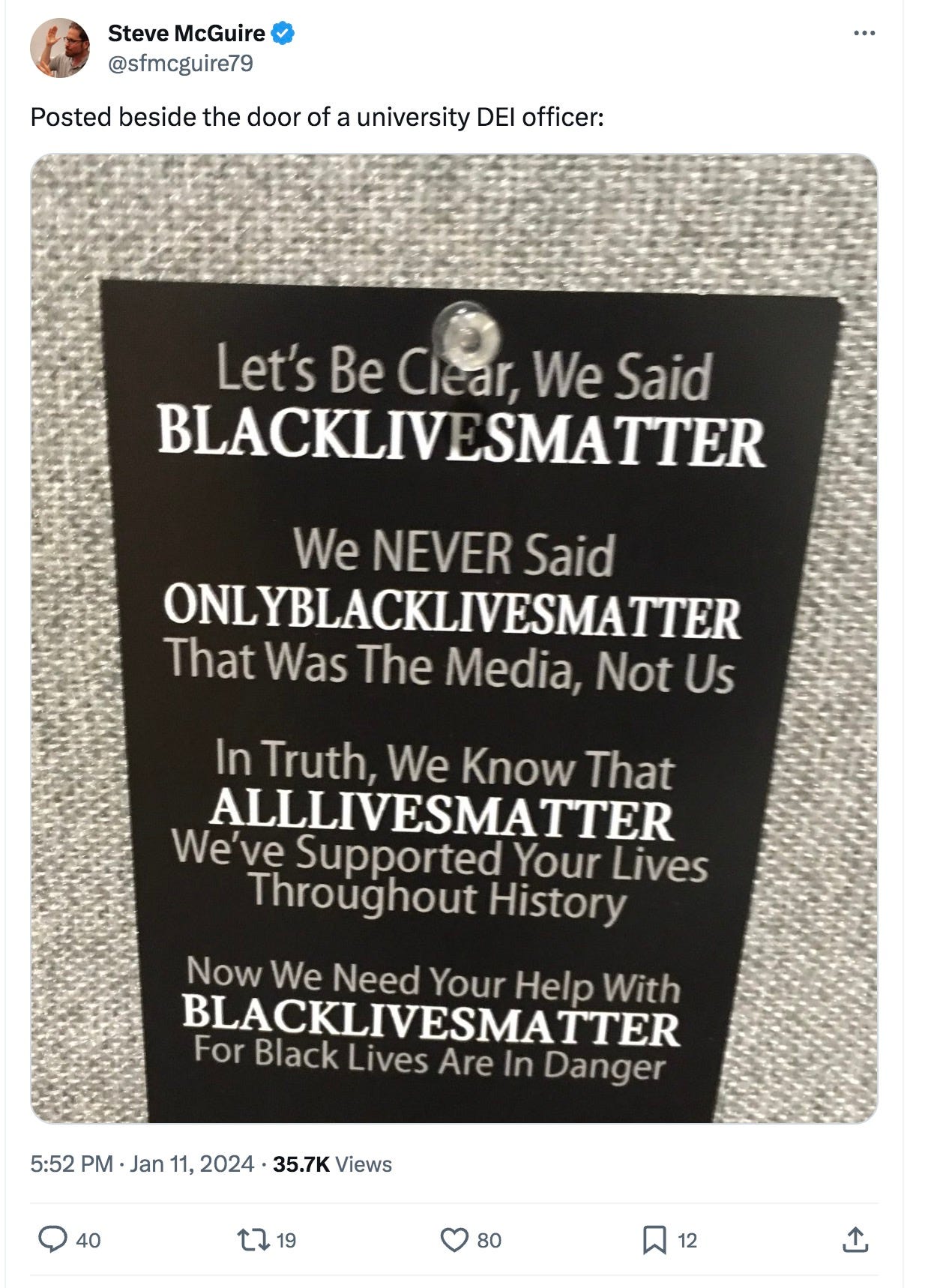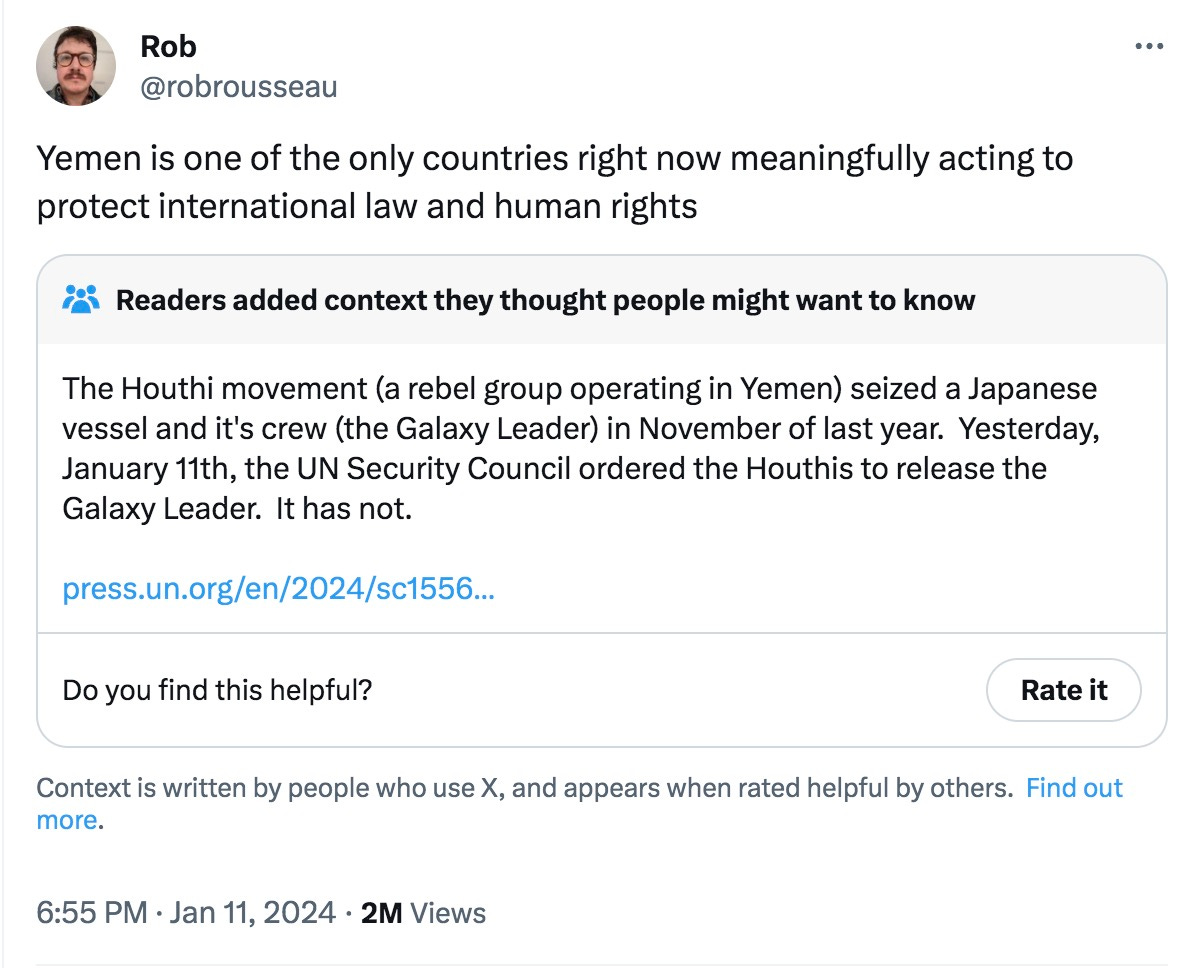E-Pluribus | January 12, 2024
In defense of fences; PolitiFiction; and DEI at the FED.
A round-up of the latest and best musings on the rise of illiberalism in the public discourse:
Timothy Sandefur: Good Fences and Civility
Timothy Sandefur has written this long piece for Discourse Magazine about civility, but begins somewhat counterintuitively with a (limited) defense of incivility. Respect for others is, generally speaking, a positive characteristic. But respect for basic principles of morality is even more important, and at times calls for something other than polite conversation.
[C]ivic education alone won’t give us a more respectful culture. We must understand how the curtailing of economic freedom is partly responsible for this crisis—and realize that we must lessen government’s violation of private property rights and economic liberty to mitigate the long-term damage we’re doing to respect for civil society in America.
A Brief Defense of Incivility
I think the first step to resolving these questions is to ask ourselves: What is the argument against civility? That might seem like a strange question: After all, it seems obvious that civility and decorum are good things that we all could stand to improve. Alexis de Tocqueville wrote in “Democracy in America” that “in the constitutions of all peoples ... there is a point at which the legislator is obliged to rely on the good sense and virtue of citizens. ... There is no country where the law can foresee everything and where institutions will take the place of reason and mores.”
In other words, our habits of interaction—our forms of deference, respect and good manners—are more fundamental forces than even the Constitution itself. They comprise the very basis of our social system, and liberty cannot hope to survive in a society where the habits on which freedom depends have been abandoned. Certainly, the Constitution cannot save us if we cease to revere the values it embodies.
Yet America’s political and educational institutions, and even traditional practices of debate, clearly seem to be deteriorating. Since at least 2016, Americans appear increasingly willing to indulge in irrational, ad hominem attacks, humiliation, intimidation and even violence. And that, of course, benefits nobody. From “cancel culture” to “shout-downs,” political decorum seems to have collapsed. And, understandably, many fear that unless these trends change, they could permanently scar our democracy and maybe even lead to civil war. As Tocqueville said, no system of legal mandates or punishments can possibly substitute for basic attitudes of mutual respect and commonality.
Yet I think we must admit that there are good arguments for not being civil. In fact, we all recognize that there are times when it is not only inappropriate, but downright immoral, to treat others with decorous courtesy. We do not compromise with the mugger who demands “your money or your life.” We do not try to calmly see both sides if a rapist attacks a woman. If there is any lesson to draw from the 1930s—or from the events of October 7—it is, as the old slogan has it, that “you cannot do business with Hitler.”
I would go further: There are times when incivility plays an important role in both democratic debate and personal integrity. Incivility sends a message about what we are unwilling to accept as normal and appropriate, aside from what the law allows or forbids. It’s good that smoking is not illegal—but I don’t have to approve of it, or consider it respectable or allow someone to smoke in my living room. If someone does, it’s right for me to throw him out of my house. It’s no less worthwhile to express my revulsion about, say, Nazis marching at the Arizona Capitol building—as they did in April 2021—or supporters of the Hamas terrorist organization throwing rocks and threatening Jewish students, as they did on Arizona State University’s campus only weeks ago. Loudly expressing our disgust about these things preserves the values on which our society rests, and it reinforces our fellow citizens’ confidence that we still take those values seriously.
But refusing to treat evil ideas with civil decorum isn’t just important for society. It also plays a role in the individual’s own conscience—something we too often neglect. In discussing questions about political discourse, we sometimes speak as though the only purpose of free speech is to help us form a democratic consensus. But the truth is that dissent’s relationship to individual conscience is more important than that.
Read the whole thing.
Jesse Singal: Why Would I Possibly Trust Bill Adair Or PolitiFact To Determine Which ‘Misinformation’ Should Be ‘Suppressed’?
Daniel Patrick Moynihan is remembered for saying, “You are entitled to your opinion. But you are not entitled to your own facts.” Sometimes it seems not everyone agrees. At his Singal-Minded Substack, Jesse Singal calls out PolitiFact for picking and choosing those facts which fit the narrative that organization wants to promote.
Nieman Lab recently ran a roundup of year-end predictions for 2024, and Bill Adair argued in one of them that “Fact-checking needs a reboot.” Adair, his bioline at the end of the article notes, “is founder of PolitiFact and the Knight Professor of the Practice of Journalism and Public Policy at Duke University.”
The first sentence argues that “Fact-checking is failing.” Adair continues: “The old way of publishing fact-checks — putting them on websites and promoting them through social media — isn’t getting them to the people who need them. It’s time to reimagine how fact-checkers publish and broadcast their work.”
[. . .]
I suspect that by “in the last few years,” Adair means something like “since Donald Trump was elected.” After all, countless journalists have decided since then that they need to be a little bit more “assertive” about what they do — that they cannot merely “inform democracy.”
As I’ve argued before, from a certain perspective it all sounds well and good — until you dig down into the specifics, into how journalists actually execute on their new supposed imperative. In this case, it’s telling that a journalism professor would speak this breezily about “suppress[ing] misinformation” without any critical inquiry into what that might mean.
This article fits neatly into a recent obsession, in some liberal circles, with the idea that the United States can fact-check its way out of various social ills and political crises. This has brought with it some fairly ominous-seeming ideas about what a “fact” is and who gets to “check” it. In this case, Adair offers no hint as to how we should determine what crosses so far into “misinformation” that it should be suppressed. Not “corrected,” not “contextualized via a note from an editor” — suppressed!
Even though he doesn’t say so, it stands to reason that as anti-misinformation technology improves (or “improves”) and more misinformation (or “misinformation”) is suppressed, it’ll be the Bills Adair of the world and their PolitiFacts that get to determine what is sufficiently untrue as to warrant suppression. This raises an obvious question: How have they done so far?
[. . .]
PolitiFact has basically failed this test.
Read it all.
Joseph Simonson: Federal Reserve Staff Underwent DEI Training Amid Rising Inflation
Along with what seems like most academic, professional and governmental organizations, the Federal Reserve has bought into the “diversity, equity, and inclusion” industrial complex. Joseph Simonson at the Washington Free Beacon has the details, which include, among other things, a transgender gingerbread cookie. Read on.
The Federal Reserve conducted diversity, equity, and inclusion trainings in which staff members learned that "correct pronoun usage is a civil right" and were told to acknowledge their "white privilege," documents obtained by the Washington Free Beacon show.
The Fed held at least four DEI training sessions in the spring and summer of 2021, the documents reveal. During the training sessions, staffers learned to use "inclusive language," like "Latinx," and were shown an illustration of a transgender gingerbread man that could have a woman's brain and male reproductive organs. Staffers were also told to refer to Federal Reserve chairman Jerome Powell as "chair," an example of "gender-inclusive language." The Federal Reserve's website refers to Jerome Powell as "chairman of the Board of Governors of the Federal Reserve System."
The training materials also asserted that individuals have a "civil right" to their preferred gender pronouns. To support the claim, the training materials cite Title VII of the Civil Rights Act, which they say "prohibits any employment discrimination on the basis of gender identity and/or sexual orientation."
The documents show the pervasiveness of DEI training in the federal government. DEI training has wormed its way into virtually every government agency. At the Department of Defense, soldiers are taught about a "male" who wants to "discuss his newly confirmed pregnancy." NASA staff are trained to believe that efforts to be colorblind "actually limit us" and warned against "microaggressions," such as saying that "America is a melting pot."
Read it all here.
Around Twitter (X)
Nate Silver puts his finger on one of the issues with the “misinformation” label:
Based on the furious and indignant reactions to “all lives matter” back in 2020, it seems fair to ask, Who exactly is “we” here? (via Steve McGuire)
And finally, socialist and apparent human rights expert Rob Rousseau with a bold statement on Yemen. Twitter’s Community Notes (along with Human Rights Watch, Amnesty International, and even the United Nations) takes a contrary position":



